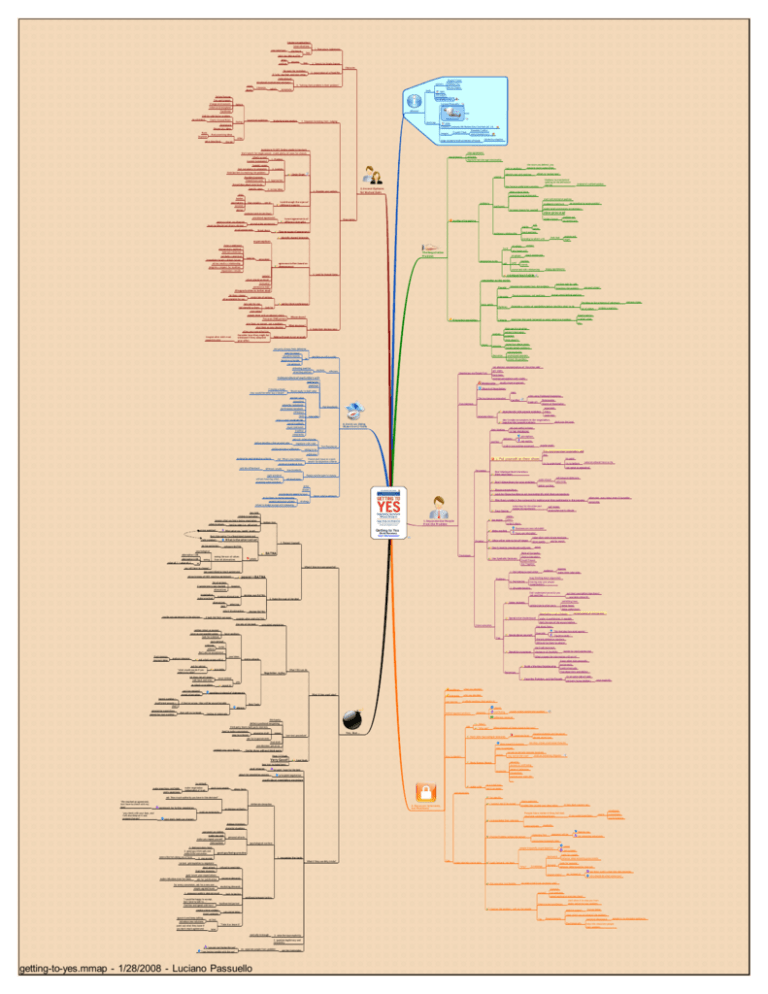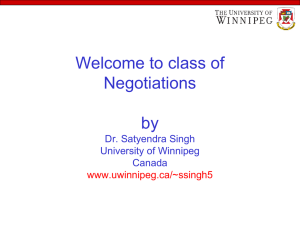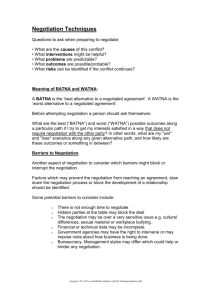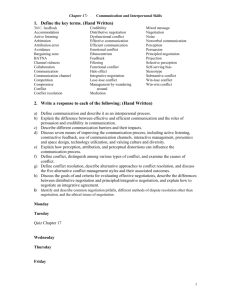Getting to Yes Summary
advertisement

hinders imagination! tense situations real intentions 1. Premature Judgement disclosure fear take raw idea as offer delay process confuse fear 2. Search for Single Answer Obstacles No room for invention 3. Assumption of a Fixed Pie If I win, you lose, and vice-versa feels disloyal Roger Fisher emotional involvement necessary yours authors 4. "Solving their problem is their problem" interests theirs satisfy William Ury Bruce Patton awareness book 1991 200 pages Define Purpose on amazon.com Few participants Change environment Luciano Passuello Before Informal Atmosphere A bo ut Facilitator Side-by-side facing problem no criticism! Clarify Ground Rules Suggested guidelines During Brainstorm brainstorming session litemind.com 1. Separate Inventing from Judging mind map Record ALL ideas Rank Most promising ideas Improve After set a time limit 2008 Creative Commons Attribution Non-Commercial 3.0 Everaldo Coelho Crystal Clear images www.everaldo.com divided by chapters map contains full contents of book Decide brainstorm IS NOT finding needle in haystack wise agreement Don't search for single answer, make plenty of room for choices What's wrong? requirements 1. Problem Current Symptoms? efficient improve/not damage relationship Suggest causes Sort symptoms in categories Circle Chart Possible strategies Theoretical cures the more you defend, you become more committed lock in positions 2. Analysis Note barriers to resolving the problem effort in "saving face" identify ego with position unwise tendency to mechanical splitting of the difference (50/50) 3. Approaches Broad ideas about what to do Specific steps 4. Action Ideas less focus in underlying concerns 3. Inv ent Options for M utual G ain 2. Broaden your options child instead of crafted solution takes a lot of time incentives stall settlement banker start with extreme position psychiatrist Look through the eyes of different experts How would a ... see it? socialist problems make small concessions as necessary increase chance for yourself slow proc e ss! combine with Circle Chart provisional agreement agree on what you disagree Invent agreements of different strengths second-order agreement issues on dispute not always obvious Prescription Break down positional bargaining Change scope of agreement on perceptions form x substance symbolic x practical look for reach agreement emphasis principles? negotiation styles agreement often based on disagreement ad hoc results x relationship families used soft friends sloppy agreements concerned with relationship reputation x results 3. Look for Mutual Gains beliefs? c omparison table values placed on time? negotiation on the merits forecasts? aversion to risk? working side-by-side Separate the people from the problem. People ask for their preference low cost for you high benefit to them Deciding on the presence of adversary basic points look for human needs behind positions Focus on interests, not positions. Interests create lots of options Options Generate a variety of possibilities before deciding what to do. Criteria Insist that the result be based on some objective standard. give them an answer, not a problem Principled negotiation market value etc. What decision? give them an easy decision diagnose the situation 4. Make their decision easy offers are more effective Consider how they might be criticized if they adopted your offer. imagine other side's most powerful critic narrows vision Expert opinion Whose shoes? Focus on ONE person inhibits creativity lot of stakes vice-versa nobody deals with an abstract entity not each other! attacking the problem All opportunities to better deal! let them choose all acceptable for you anger dominates soft The Neg otiation Pr oblem progress x respect for tradition resentment feels bad victory emphasis hard immediate future x distant future power bending to other's will economical x political no agreement will hard positions endangers relationship identify shared interests internal x external walking out higher chance battle small agreements no incentive to move quickly! stubbornly hold to it inefficient doctor gather information analysis Making threats is not enough organize think about it stages same four above again planning handle people problems one party always feels defeated communicate open to reason closed to threats based on principle understand interests discussion deciding on will is costly be attack the problem not pressure not abstract representatives of "the other side" defending position no time attacking position efficient get angry Negotiators are People First have egos independent of each side's will confuse perceptions with reality legitimate usually more important Relationship practical if buying a house Object of Negotiation Should apply to both sides how would the seller buy a house? egos market value when using Positional Bargaining The two become entangled precedent Conflict separately deal directly with people problem costs examples moral standards yours too! don't make concessions in the negotiation, based on the people problem 4. Insist o n Using Objectiv e Cr iteria equal treatment tradition IS THE PROBLEM! not reality conflict negotiate with roles taking turns perceptions between one cut, other chooses maybe weak! truth is just another argument Fair Procedures The most important negotiation skill arbitrator agree on standards first split the difference! different results feel Put yourself on their shoes Frame each issue as a joint search for objective criteria Ask "What's your theory?" Reason and be open to reason Don't blame them for your problem suggest objective criteria Look for Opportunities to act inconsistently with their perceptions strategy when in groups hard to raise (i.e. sell price) alternative 2 OR value alt 1 + value alt 2 write it down Getting to Yes Emotions are non-refutable! Make explicit Facts are refutable! Book Summary http://litemind.com value other side's strong emotions W hat is the alter native? Allow other side to let off steam Emotion 1. Protect Yourself unknown BATNA seeing the sum of values from all alternatives Use Symbolic Gestures pitfalls as Problems imagine imaginative Listen Actively only if it's attractive maybe non-agreement is the solution Did I understand correctly you just said that ... ? if both BATNAS are good Speak to be Understood consider other side's BATNA make it confidential, if possible limit the size of the group meeting principled negotiation Communication Not about them force positions analyze response Difficult for them to rebate! don't talk too much What purpose the information will serve? enemy attacks Know other side personally Build a Working Relationship turn sides "what would you do if you were in my side?" What YOU can do never defend seat back and relax questions instead of statements What if they won't play? if they're wrong, they will be uncomfortable positions what you decided interests why you decided one interest Best Tools WAIT shared behind opposed positions feeling of stalemate conflicting interests Ask third party learns both parts interests hard to make concessions generates draft easy to criticize repeat "Why?" What interests of theirs stand in the way? "Why not?" Yes, But... "one-text procedure" final draft easy to overlook Can be done without third-party Page 117 Book V ery Good! money How to Identify Case Study about the negotiation process examples principled negotiation verify assertions "you check with your boss, and I will also sleep on it and propose changes" recognition ... make a list phony facts or a mind map put it on paper communicate be specific ask "How much authority you have in this decision?" "We reached an agreement, but I have to check with my boss" sense of belonging control over one's life usually about negotiation procedure don't trust people even on monetary disputes economic well-being be quiet, hope for the best by default make negotiation independent of trust we see as the only interest involved may not be the case! security Basic Human Needs long (not included here) usual response almost never true see also: classic motivation theories Most powerful interests one decision: yes or no Assume interests are the same! Common Error Each side has multiple interests ask for improvements mediate your own dispute usually makes agreement possible! different (neutral) third-party deflects positional bargaining make assertions verifiable deliberate deception agreement for further negotiation "correct me if I'm wrong" 2. Focus on Inter ests, no t Po sitio ns ambiguous authority insist on reciprocity shows openness if they don't correct you implies they accept your description if you understand them you're Acknowledge their interests dubious intentions communicate stressful situations comment on clothes make you wait make you repeat yourself personal attacks interruptions opponent will be What if they use dirty tricks? variant: prerequisites to negotiate not purpose looks for causes backward 1. recognize the tactic 3. you accept don't attack Talk make interests come alive Look forward, not back "Why?" refusal to negotiate forward 2 meanings behavior determined by prior events looks for purpose behavior determined by free will find their interests choose wisely! Be concrete, but flexible 1. announce publicly desired result create a time window invert pressure ignore it and keep talking introduce new solutions point out what they loose if you don't reach agreement ask them justify what they did yesterday who should do what tomorrow? An open mind is not an empty one! escalating demands reopen agreed issues find him and speak with him! ex: instead of extreme demands ask for justification "I would be happy to accept, but I have to talk to..." not preparing arguments cause people frequently argue based on goal: lower your expectations worth listening hearing you conclusions/proposals later psychological warfare good-guy/bad-guy routine for every concession, ask for a new one sympathetic explicitly reasoning first Put the Problem before the answer 1. bad guys plays hard 2. good guy interrupts and make little concession make ridiculous even for them intelligent People listen better if they fell that you have understood them. joint draft (both can change) seems like he's doing you a favor raise explicitly multiple positions that satisfy it silence they will try to break Sit at same side of table partners facing problem recast it! honest question + insufficient answer = generating suggestions answering your question meet informally Face the Problem, not t he People you as attack on problem reveal information arrive early find about likes and dislikes Prevention Negotiation Jujitsu let them let off steam harder to reach agreement disclosure of flexibility Speak for a purpose your ideas ask what's wrong with it ask for advice can't be resisted! "You're a racist." Prevent defensive reactions invite don't ask for acceptance find interests "We feel discriminated against." Example Speak about yourself Tips don't defend! improve ideas No persuading of third parties! Negotiation is not a Debate! look for interests advice being heard being understood disclose BATNA the rest of the book criticism ...and later refute it! not killing time satisfaction to other party neither reject or accept treat as one possible option put their case better than them! 2. Make the most of the deal selecting best hearing only your people (constituency) develop your BATNA improve alternatives alternatives make them take sides busy thinking about arguments 2. Not hearing 3. Misunderstanding alternatives make practical impress audience 1. Not talking to each other pow er = BATNA list of actions if agreement is not reached Visit to Cemetery Small Present Eat Together What If they're more powerful? too committed to reach agreement attractiveness of NOT reaching agreement spiral Note of Sympathy Techniques you will have to choose! ask for more! listen quietly Don't react to emotional outbursts BATNA seeing avoid other part's ridicule yours be aware 1. Sep ar ate the People fr o m the Pr o blem bottom-line What price you "ought" to get... psychological alternative 1 OR ownership self-image theirs Best Alternative To a Negotiated Agreement be too optimistic make easy for the other part explain the agreement Face-Saving inhibits imagination right question! otherwise, may reject even if favorable Give them a stake in the outcome by making sure they participate in the process refuse to budge except with reasoning wrong question! will resist better wording Discuss perceptions Never yield to pressure too rigid ignores what you learn during negotiation will become defensive under attack bribe threat manipulative appeal to trust same emotional force as his Don't deduce their intentions from your fears ask third party invite them to reveal reasoning try to believe not same as agreeing! Perception right standard his point try to understand two standards without knowing who's proposing what standard don't mix the two! not just useful to know their thinking reciprocity pretend he used objective criteria theirs Separate them! what a court would decide picking among a collection Object of Negotiation Fair Standards efficiency before deciding who's on each role Relationship trade-off Two Interests scientific judgement professional standards interests commit lock-in tactics not positions spend aggressive energies there! positional pressure tactics hardhearted partner Desire to be conciliatory Hard on the problem, soft on the people don't allow it to stop you from doing justice to your problem positive support calculated delay human being vigor which you emphasize the problem Tip at first later normally is enough 2. raise the issue explicitly 3. question legitimacy and desirability "you put me facing the sun" "I am having trouble with the sun" Equal strengths cognitive dissonance Psychologically "Take it or leave it" ex: separate people from problem getting-to-yes.mmap - 1/28/2008 - Luciano Passuello use the 4 principles people try to dissipate ambiguity helps him dissociate people from problem








